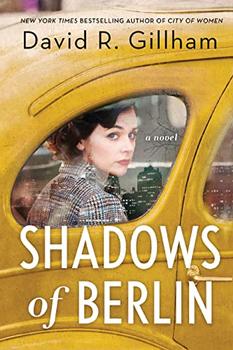Summary | Excerpt | Reading Guide | Discuss | Reviews | Beyond the Book | Readalikes | Genres & Themes | Author Bio

A Novel
by David R. Gillham
"I'd like you to consider painting again," says Dr. Solomon.
Rachel stares. "Painting."
"Yes."
She feels a sickly terror and has to look away, glancing at the leather sofa to see if Eema has arrived, but it is empty of mothers. "And why should I want to do such a thing, Doctor?" she asks. To push a brush into the crazy woman's hand. To shove her at a canvas and order her to paint? It's dangerous. What raving madness might explode from her body and bloody the canvas?
And yet! "It could be very helpful," the good doctor submits. "Creativity can often provide emotional relief." But he does not press the matter. "Give it some thought," he suggests. "That's all I'm saying. Your art," he tells her. "It seems to me that it plays a large role in forming your self-identity."
Her self-identity. That ragged patchwork of truths and untruths. In the war, her identity was dependent on forged documents. It was her ersatz self that she clung to, because her true identity could murder her.
***
One of the first things that shocked her about New York City, apart from the looming towers of Midtown and the crowds swarming the sidewalks, were the filthy streets. Berlin was a clean city before it was pummeled into ruin. No one dared drop trash in the street; it would have been unthinkable! Undenkbar! But New York is a pigsty in comparison. The gutters are clogged with trash. Ash bins and garbage barrels overflow. Dogs are permitted to soil the sidewalks with impunity.
Last year, the city government erected a gigantic wire bin in the middle of Times Square, loaded with trash collected from the streets. The accusation was clearly printed in huge letters: THIS LITTER BELONGS TO YOU! YOU MISS THE LITTER BASKET WITH 1,200 POUNDS A DAY IN TIMES SQUARE ALONE! Going down into the subway is not better. Squashed cigarette butts everywhere. Sandwich wrappers, crumpled bags, discarded pop bottles, fruit peels, and half-eaten hot dogs crawling with ants. Of course in Berlin, there was a time when she was one of those ants, trolling the gutters and bins for food.
Advertising cards on the Lexington Avenue Local provide a lesson on Good Subway Citizenship as the train bumps through the tunnel: PLEASE, DON'T BE A SPACE HOG, A DOOR BLOCKER, A FEET RESTER, A LEG PEST, OR A LITTERBUG! All instructions that are generally ignored by passengers. This is also a difference between New York and Berlin. In Berlin, who would have dared smoke where the sign commanded RAUCHEN VERBOTEN! Or dared be a Jew where the notice declared JUDEN VERBOTEN!
The crowd in the car thins out. It's then that Rachel notices a child staring at her. A little girl, four or five years old, with a knit hat and silky brown bangs across her little forehead. Her eyes are shiny buttons, and she gazes at Rachel with innocent interest. A contented little fox caught out in the open, yet who can look through a person to spot the animal truth of them.
It's not that Rachel does not want children. She does, or at least there are times that she does. The desire for a child of her own strikes her in moments of urgency. Perhaps that's how she herself was conceived. In one of her eema's moments of urgency. God knows it's difficult to imagine Eema actually planning for such a process as conception. Drafting out a child in her mind, laying down the sketches in her heart before a child filled them in, filling up her womb. Before a child stretched out her body and confounded her life. Before it ruined her punctuality, disrupted her routines, drained the color from her lips, and demanded strict attention on a tyrannical scale simply to survive the day. Would she have ever actually agreed to such a disruptive intrusion with the benefit of forethought? Doubtful. Her daughter must have been an accident of the moment.
Gazing back at the girl with the straight brown bangs, Rachel can only view motherhood as a foreign concept. Like the moon or like the American Dream. To dream like an American? What does this mean? Even after becoming a citizen, she does not know. Perhaps because she is still only partially here in this country. Part of her is still buried in the cinders of Berlin. Before she was Rachel the American, she was Rashka or Rokhl or Ruchel, or her mother's Little Goat. And it is little Rashka's terror that punctures any urgent moments in Rachel's life that might lead to conception. Any true desire for a child of her own is restricted to a wistful reverie, in the same way she might imagine what-if. What if her mother had loved her as much as she loved art? What if she had remained an innocent? What if she had never shared a table with the red-haired woman in a Berlin café? What if horses could talk and pigs could fly? What if.
Excerpted from Shadows of Berlin by David R. Gillham. Copyright © 2022 by David R. Gillham. Excerpted by permission of Sourcebooks. All rights reserved. No part of this excerpt may be reproduced or reprinted without permission in writing from the publisher.
Your guide toexceptional books
BookBrowse seeks out and recommends the best in contemporary fiction and nonfiction—books that not only engage and entertain but also deepen our understanding of ourselves and the world around us.